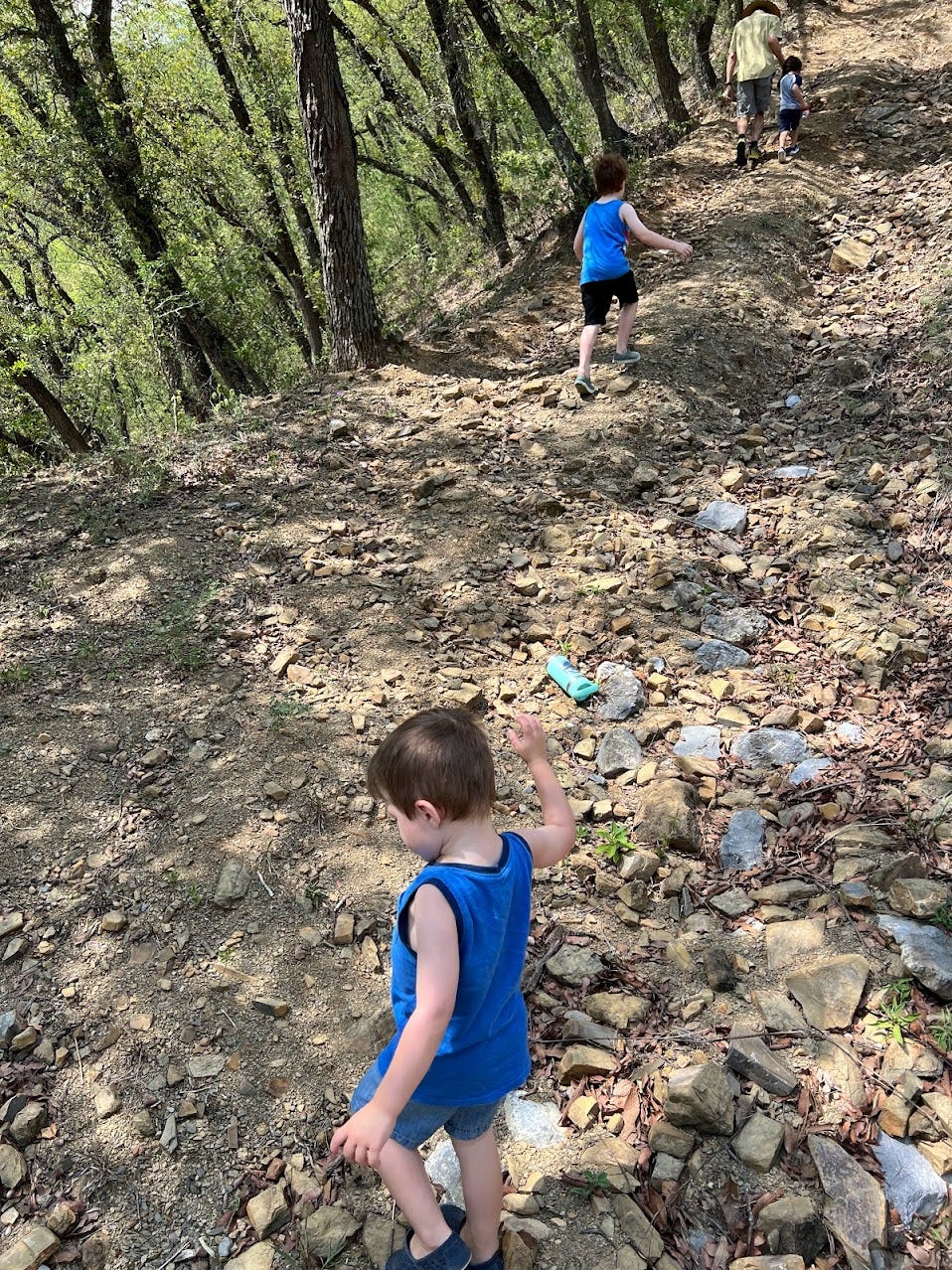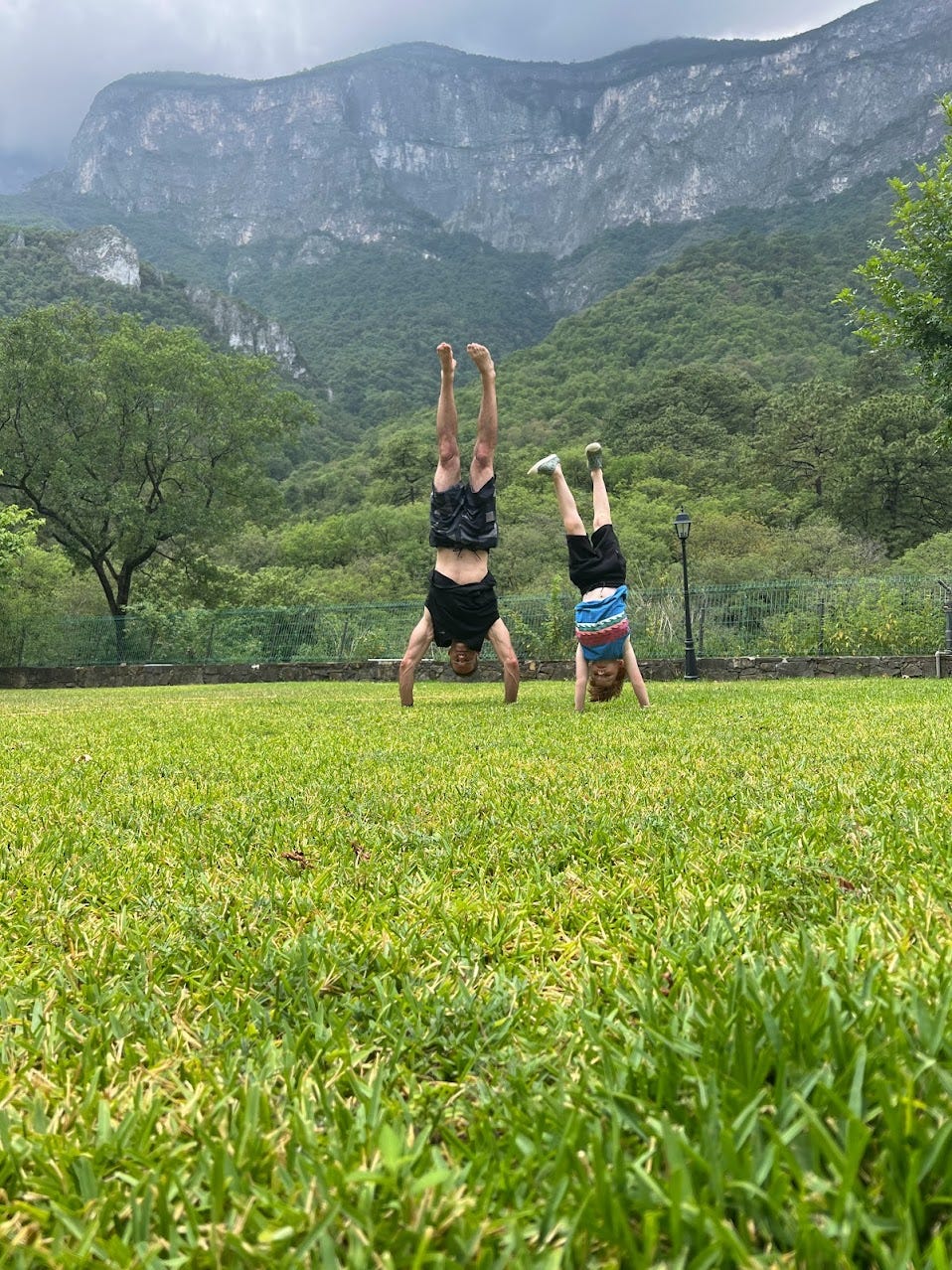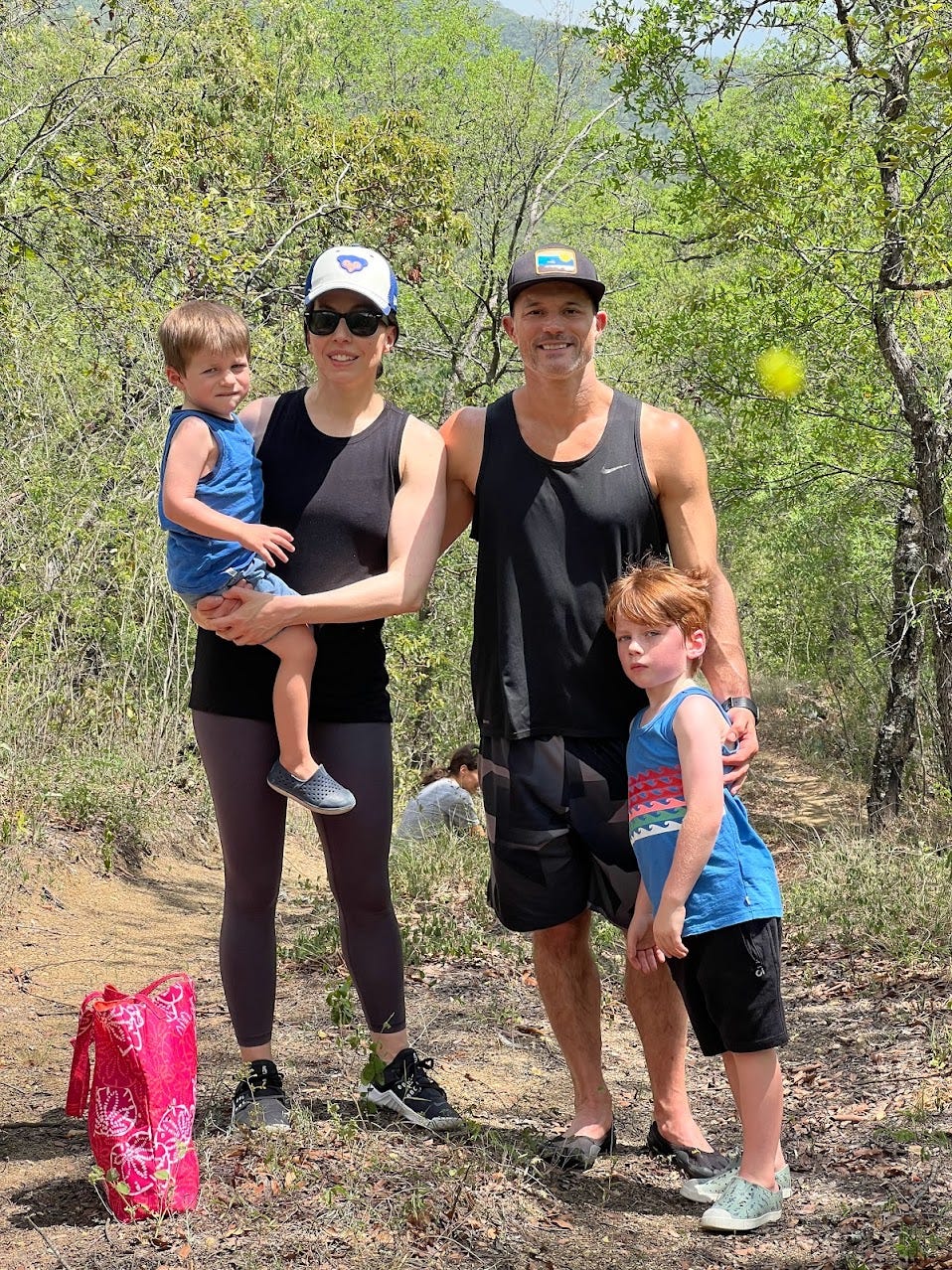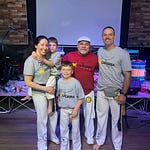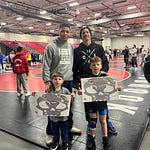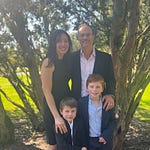🔥Welcome to Volume #00090!🔥
I’m Christian Champ. This is ☯️The Middle Way Newsletter ☯️. It is a place where I write, explore, share, and invite you along for the journey.
If you enjoy the newsletter, please share it with your friends.
🏞️How We Can Find More Flow Each and Every Day 🏞️
I felt lost.
I felt lost in the moment.
I felt lost in the mountain.
Hiking the Sierra Madera Oriental mountains with family and friends helped me get lost… the good kind of lost.
Our short hike turned into a multi-hour adventure going up and down hills. The power of the group pulled and pushed me to keep moving and lose my sense of self.
We were a group, and we were the mountain. The boundaries of US converged into a WE.
Flow is always there for us to grasp, ride and hold on to; we need to create the conditions for it to thrive and come alive.
We don't need a mountain to hike, ski, or climb, but nature is helpful.
We don't need a group, but community assists in the process.
Creating the Conditions
The first step in finding our flow is to create the conditions.
Think back to the moments that you find yourself in flow.
How can you help manufacture them and provide the conditions to help you slide into flow?
How can you create a runway to flow and increase meaning in your life?
When we create sacred spaces for sacred practices, we ignite flow.
Common flow triggers include movement (our mind and body), nature, music, and substances (coffee, please).
The Flow Cycle consists of four states:
Struggle
Release
Flow
Rest and Recovery
We want to make it easier to get through the stages, to hit stage three, where we perform at our best and feel our best.
🗺️Here is one road map to find more flow
#1 Rest and Recovery
The conditions for flow start by being rested and recovered.
The better we sleep, eat and create emotional stability (like breathwork), the more primed we find ourselves for flow.
Think about days when you wake up rested and ready and how that lets you conquer the day.
#2 Routines and Rituals
Anytime we do things repeatedly, we can create a sacred routine and ritual around it. The routine and ritual prep us mentally for the tasks and lets us drop in more quickly.
Routines and rituals push us through the struggle and release phase by greasing the tracks.
We can use simple movements like meditation, reading, or a walk to help ignite our flow cycle.
More challenging tasks can involve more profound routines and rituals, including uniforms, practices, coaching, and community to help us thrive.
The more we stack our flow triggers during our rituals, the easier it is to find flow.
Meditation + Journaling + Music + Coffee = Flow
My morning routine consists of meditation, followed by journaling while listening to music and drinking a coffee. This primes me for flow from that jump and lets it bleed into the rest of my day.
Flow follows focus, and routines and rituals help us to enhance our focus.
Any good routine starts to push us into the flow state. When our routines grow stale, we need to remix them and begin again.
#3 Challenging Ourselves
Flow thrives when the challenge-to-skill ratio is tuned just above our current maximum efforts.
We want to be at the top of our ladder, reaching up slightly beyond what our fingers can grasp.
When we face too little challenge, things get boring, and the flow fades. We stop flowing when we get smashed by a challenge beyond us.
The easiest way to do hard things is by increasing our exposure to them. When we turn up the dial, we drop in even deeper.
#4 More Flow = More Flow
Flow is additive, 2+2 = 10.
When we set up our lives for more flow, we create more flow throughout our day.
That is the power of the morning rituals to start our day off with flow. We then carry those accumulated flow points into later parts of our day.
We become the rushing river.
#5 Change When We Block Flow
When we find ourselves dragging, we reset with a walk, breathwork, exercise, or playing some tunes (or stacking them).
This pushes us back into the mindstate we want.
The person you don't like dealing with at work, what happens when you change your orientation to them? How much time does it take to find another path to make the interactions palatable?
The commute is always a struggle; what happens when you reframe it or approach it differently?
These subtle moves may not unleash flow at that moment, but they can help us get more of #4 by stopping the conditions that drain us.
We want to clear the river of debris that blocks our flow to get it back to rushing.
#6 Keep Searching for Our Flow Triggers
Lastly, we need to always be looking for new flow triggers.
When do we feel those epiphanies? Who are the people that help us unlock flow? What are the environments that create it?
As we notice these peak moments, we want to build on them. We want to add them to our bag and put ourselves in those positions more frequently.
At the same time, when triggers diminish or go dark, we need to experiment with new ones. We are constantly changing, and we need to follow our changes.
How do you want to re-rack your day to create more flow?
📓Things to Think About📓
Oliver Burkeman offers 8 Secrets for a Fulfilled Life
Oliver offers eight great ideas, many of which correspond to essays from The Middle Way.
1/ Life offers abundance, but we need to choose.
Like our piece today on flow, we need to figure out what to focus on (what do we want to be 1% in) and be ok neglecting the rest (or using the power of constraints).
The only viable solution is to make a shift: from a life spent trying not to neglect anything, to one spent proactively and consciously choosing what to neglect, in favour of what matters most.
2/ When stuck, embrace enlargement over happiness
Choose growth for ourselves as a north star. Are we playing the infinite games and the games we want to play? Are we around people that push us to be our best and not just make us feel good?
I’m indebted to the Jungian therapist James Hollis for the insight that major personal decisions should be made not by asking, “Will this make me happy?”, but “Will this choice enlarge me or diminish me?” We’re terrible at predicting what will make us happy: the question swiftly gets bogged down in our narrow preferences for security and control. But the enlargement question elicits a deeper, intuitive response.
3/ Developing the ability to deal with discomfort is a superpower.
It’s like Jocko’s favorite saying of “Good.” The weather is bad, good. I have a flat tire, good. Each hurdle means you get one more thing to overcome.
It’s possible, instead, to make a game of gradually increasing your capacity for discomfort, like weight training at the gym.
4/ The advice we don’t want to hear is likely the advice we need to hear.
This is why I love coaching and trying to help people get to where they want to go. Life is a multiplayer game, and there are many ways to help ourselves on this journey. It is also why I journal every day as the small acts pay huge dividends.
One good question to ask is what kind of practices strike you as intolerably cheesy or self-indulgent: gratitude journals, mindfulness meditation, seeing a therapist? That might mean they are worth pursuing.
5/ The future will never provide the reassurance you seek from it.
There is no finish line. We don’t beat the game.
The spiritual teacher Jiddu Krishnamurti said his secret was simple: “I don’t mind what happens.” That needn’t mean not trying to make life better, for yourself or others. It just means not living each day anxiously braced to see if things work out as you hoped
6/ The solution to imposter syndrome is to see that you are one.
Everyone is making it up. There are no wizards, and we are all making it up as we go. This is good for us, as it takes the pressure off.
Humanity is divided into two: on the one hand, those who are improvising their way through life, patching solutions together and putting out fires as they go, but deluding themselves otherwise; and on the other, those doing exactly the same, except that they know it. It’s infinitely better to be the latter (although too much “assertiveness training” consists of techniques for turning yourself into the former).
7/ Selflessness is overrated.
If you’re prone to thinking you should be helping more, that’s probably a sign that you could afford to direct more energy to your idiosyncratic ambitions and enthusiasms. As the Buddhist teacher Susan Piver observes, it’s radical, at least for some of us, to ask how we’d enjoy spending an hour or day of discretionary time.
8/ Know when to move on
This last point became near and dear to me recently as I wrote about here.
And then, finally, there’s the one about knowing when something that’s meant a great deal to you – like writing this column – has reached its natural endpoint, and that the most creative choice would be to turn to what’s next.
Daniel Kazandjian gives his short takes on Principles for Personal Development
Daniel offers some rules for personal development. My favorites from his list include.
GO!
Don't wait until you've figured out your life's purpose. It’s actually impossible to do so by waiting.
Instead use your instinct for admiration to orient your aims and get after them. Clear enough is clear enough. Define your ideal self and go.
Building Habits
The best way to remove an old habit is to change your environment. The best way to embody a new one is to consciously commit to it for at least a month.
Commit
List the possible sacrifices. Look at them consciously and decide “is this a good deal?” Then commit. Things will get hard but this time you’ll be ready.
Use Rituals
Create a memorable, multi-sensory experience to demarcate the beginning of something new, the end of something old or the return to something valued.
Dan’s podcast is great and highly recommended.
Twitter thread I created on Tyler Cowen and Daniel Gross solid book Talent. Click here for the full list.
🎧Things to Listen, See, and Watch 🎧
Jim Rutt Talks with Greg Thomas about Race
Greg uses the principles of jazz to help enhance leadership (Jazz Leadership Program).
He believes we do the world a disservice to see the world through race.
Greg: We need to face that what we call racism is actually tied closely to the very idea and concept of race, the process of racialization and a racial worldview, which basically, if you think about John Vervaeke’s basic definition of worldview, he says, “Worldview, it is a guideline for how we see the world and how we act and behave in the world as agents.” So if we see the world through the lens of race, then it’s like, “Well, the world is made up of these races and therefore, we act and behave based on that,” and it’s a bunch of malarkey, man.
Before he want down the radicalized rabbit hole, he looked at music and saw the beauty of cutlure not one’s race.
Greg: But when I got to college, I really started delving into it. These feelings of close to hatred started coming up, and it was my love of jazz music and people in jazz music who themselves would be classified as white. Also, frankly, my love of European Western music, European, I should say, classical music, it was called classical music, concert and chamber music that allowed me not to go over the cliff of racial hatred. Culture is something that is very powerful, because that’s where internally our values and the meanings we derive from the things that are important to us derive from, and then the artifacts, what we create based on those values and meanings that show up in the world as art forms, that show up as creativity and creations, as rituals, as myths, all of those things are very important parts of human history. We can look at those as a much stronger basis in index for human motivation, behavior and aspiration than a bullshit idea like race.
We are all multitudes.
Greg: So we are a real big mixture here. We are not any one thing. So if we can accept that in cultural terms, accept that as, to put it in a very fundamental way, Ralph Ellison once said this to a group of Harvard students, “All y’all are part Black and I’m part white.” Okay, if you want to put it like that. But this mixture is what really makes us a people and as dynamic as we are, but we don’t have to hold onto the idea of race to do it. We could lean on culture, in my opinion.
He is not a fan of the popular anti-racist and pushing race over culture.
Greg: So, you don’t hear people like DiAngelo or even Kendi talk about these cultural dynamics. They’re so focused on race and racism. You don’t hear them talking about racialization or racial worldview. So, they’re too limited. That’s why I said I’m sorry. It’s like I don’t even know if I could say it’s college level. I know there may be many people who are shocked to hear me say that, but I’ve done a lot of reading and study over the years and I know levels, and these folks do not match up. I don’t give a damn if they’re popular. I don’t give a damn if they’re on all of these lists that you’re supposed to read if you want to be an ally. They are too limited in their vision and in the solutions that they propose, that is not the way to go.
We are always looking for something better and let’s find it.
Greg: So Ralph Ellison says that the techniques of jazz came from this combination, like a desire to be able to play as technically well as learned musicians, but those who played by ear, they had some great things too, so there was a real confluence there. So when we look at that history, when we look at those cultural dynamics, you have within jazz music, and this is what Murray said, he says, “It’s not like the people who played jazz didn’t want to play European classical music.” In fact, that was the part for many, Art Tatum, Oscar Peterson arched in so many, that was a part of what they learned how to play. But this is what Murray says about not only Black American musicians, but Americans overall. It’s like we learned about those things, but we were always looking for something better. You know what I mean?
Greg: So it’s like we can learn from the past, but what are we going to create that will be for our time and for our generations to follow even better, to not be confined to the greatness of the past, what can we do to search for something even better, even more generative, even more fruitful to gather around and strive for? You know what I mean? So it’s a combination of like foundations. We have certain foundations that we get from the past, but baby, we got to look for something better, because we know we are in a mess and we need enough of us to be leaders and to be out front with a new set of ideas and a new set of ideals influenced by the best of the past, but that is forward-looking so we can get out of this poly and meta crisis that we’re in before is too late, because boy, there’s a lot of work to be done.
Krista Tippet Interviews adrienne maree brown on the OnBeing Podcast
browne reminds us that we are always practing, but we need to decide what we want to practice.
browne: That’s right. And there’s so much awakening. So I always tell people that you’re always practicing things. So it’s not like you go from not practicing to practicing, but it’s, are you practicing things on purpose? Are you practicing things you would want to practice, or are you practicing what someone else has told you [laughs] is the right way to do stuff? And once you start practicing on purpose, then you can actually practice liberation and justice and freedom and — then I think you begin to have this contentment that comes from practice.
We need strategy to get where we want to go and adapt to the landscape.
browne: And the strategy part comes in — I think what we mean by strategic is: able to adapt to changing conditions, while still moving towards our vision of freedom and the future and being in that practice. So that’s what emergent strategy is. It’s like, how do we get in a right relationship with change that allows us to harness and shape things, towards community, towards liberation, towards justice?
We need a death practice.
browne: How do I get good at dying? How do I get to where I’ll be at peace when my time comes, because there’s other generations that need to survive off of the resources of this place? [laughs] It’s in the design.
Tippet: Someplace you’ve said, “Emergence is our inheritance as a part of the universe; it is how we change.” And emergence doesn’t wait for us to be ready for change, and we’re really in an accelerated moment of that right now.
Tippet: I just want to read a beautiful — some beautiful sentences you wrote, so powerful, and I think this is in We Will Not Cancel Us. [Editor’s note: This passage is from Emergent Strategy] “We are brilliant at survival, but brutal at it. We tend to slip out of togetherness the way we slip out of the womb, bloody and messy and surprised to be alone. And clever — able to learn with our whole bodies the way of this world.”
No matter what it starts with us.
brown:“We must transform ourselves to transform the world.”
💣Words of Wisdom💣
"In maths it is a rule that 2 + 2 = 4. In psychology, 2 + 2 can equal more or less than 4. It’s up to you." - Rory Sutherland, Alchemy
"This is one way to understand narcissism: it is falling in love with yourself at a particular liminal passage to such an extent that you are unwilling to submit yourself to further transformative experiences." - Venkatesh Rao, Tempo
"Danger was the grindstone on which the swordsman whetted his spirit. Enemies were teachers in disguise." - Eiji Yoshikawa, Musashi
"By doing the work, you can trust that interesting questions will emerge." - Sönke Ahrens, How to Take Smart Notes
"But that's the thing about death-it makes you appreciate life. It's almost impossible to appreciate something without facing its absence. Just as we cannot improve ourselves if we cannot acknowledge where we've floundered, and atone." -Sasha Sagan, For Small Creatures Such as We
"You master the art by practising the act. You have to get in front of people and watch and listen for what resonates with them." - Bernadette Jiwa, What Great Storytellers Know
"She comprehended the perversity of life, that in the struggle lies the joy." - Maya Angelou, I Know Why the Caged Bird Sings
"We become aware of the fundamental truth that everything comes and goes: every thought, every lovemaking, every life. We see that dying is in the life of everything. Resisting this truth leads to pain." -Frank Ostaseski, The Five Invitations
"Scientists have discovered that the more we resist temptation, think deeply, or focus intensely, the better we become at doing so." - Brad Stulberg, Steve Magness, Peak Performance
"Humans are prostalgic, enamored by little predictions. But the future is an anarchy that refuses to be governed by even the soundest forecasts." (Derek Thompson, Hit Makers)
"If you want to get better at what you do, if you want to get better at this thing called life, you have to pay attention. When you pay attention, you can remember what really matters, what is real and enduring, versus what is false and fleeting.” - Russ Roberts @EconTalker
🙏Thanks for Reading🙏
How can you change up your day to unlock more flow? What are the flow triggers that you need to go back to?
Any thoughts or comments, please share!
Namaste,
Christian
I’m not sure we all stayed in the flow state, but some of us did!




